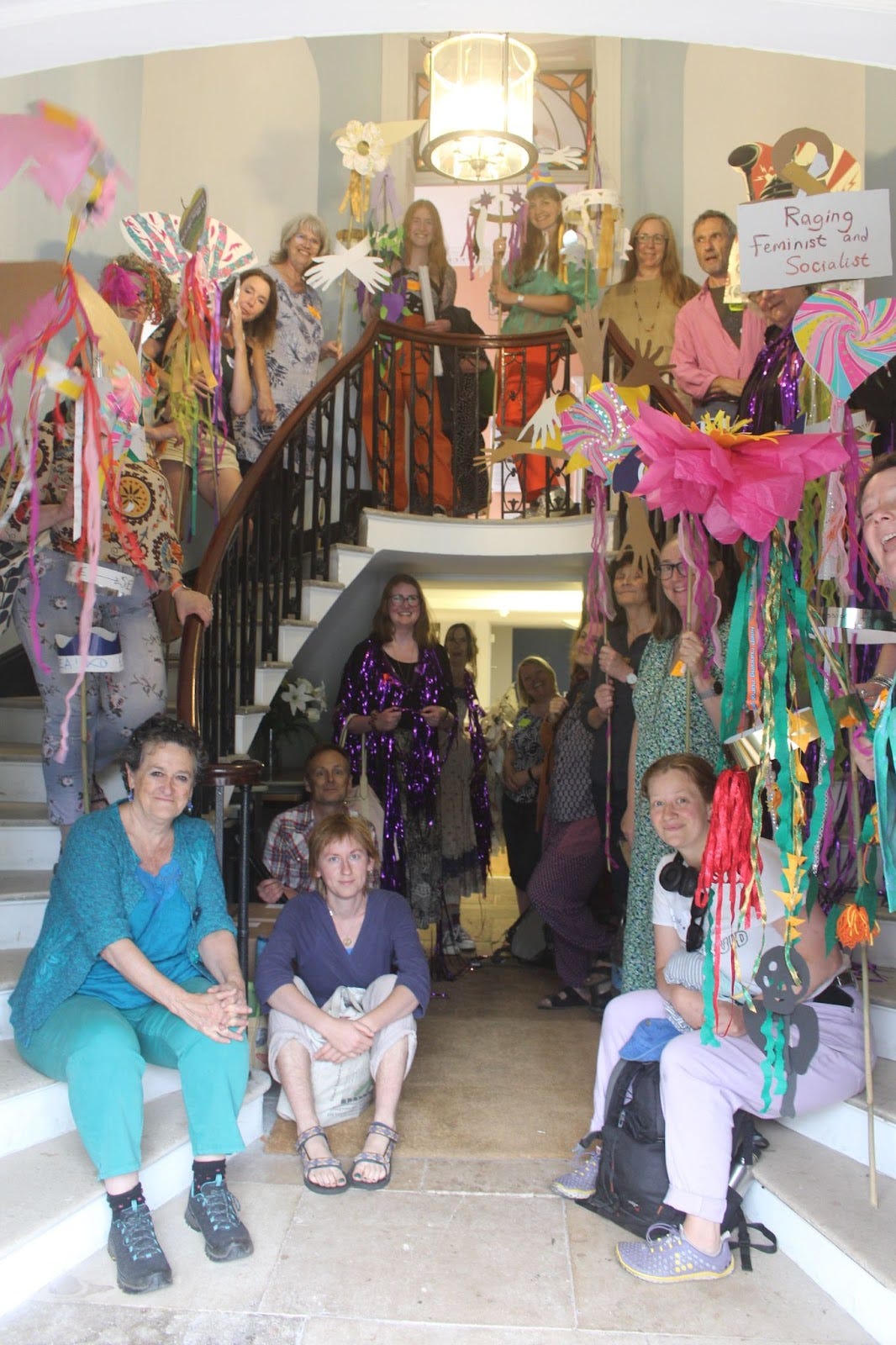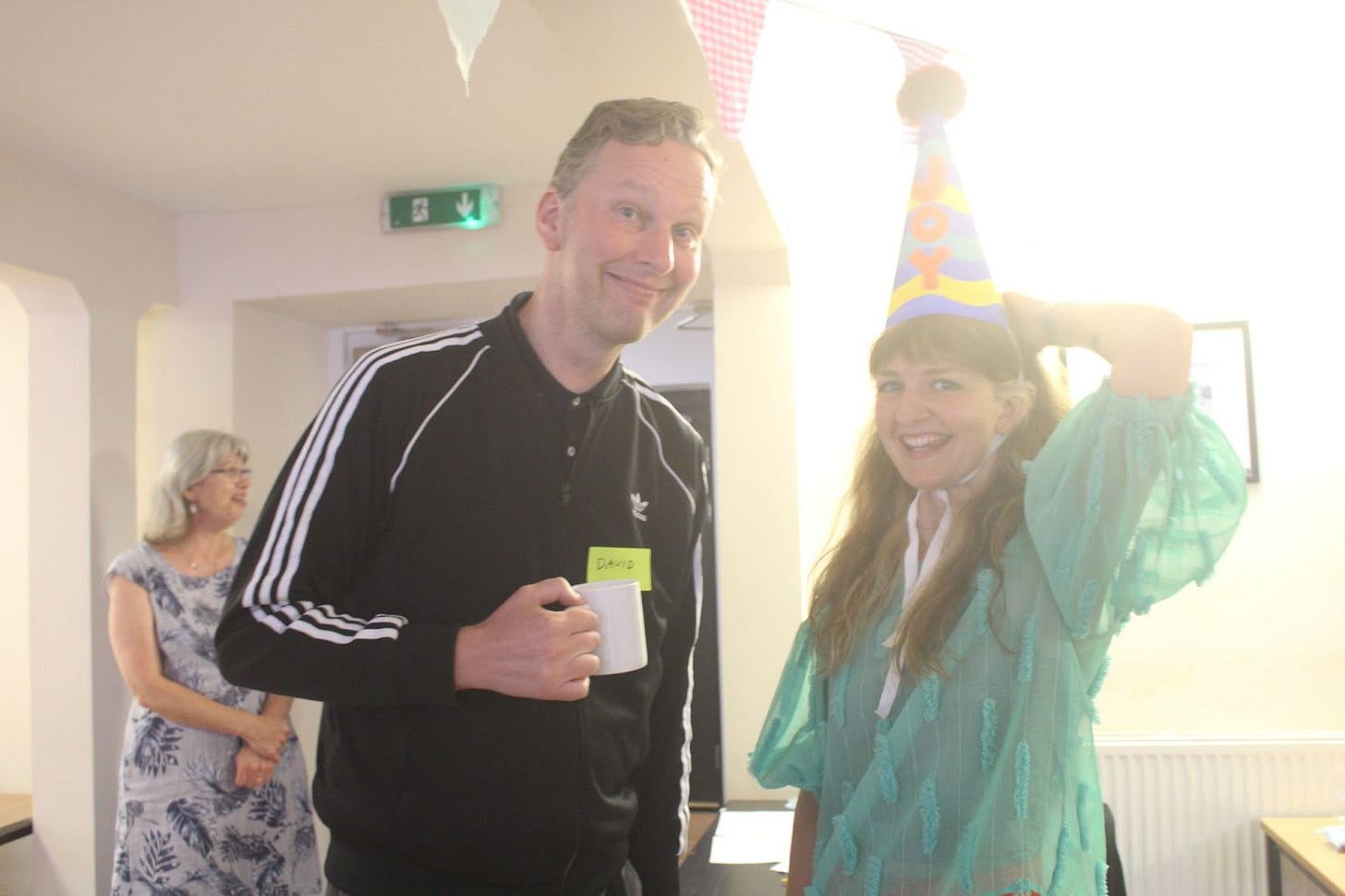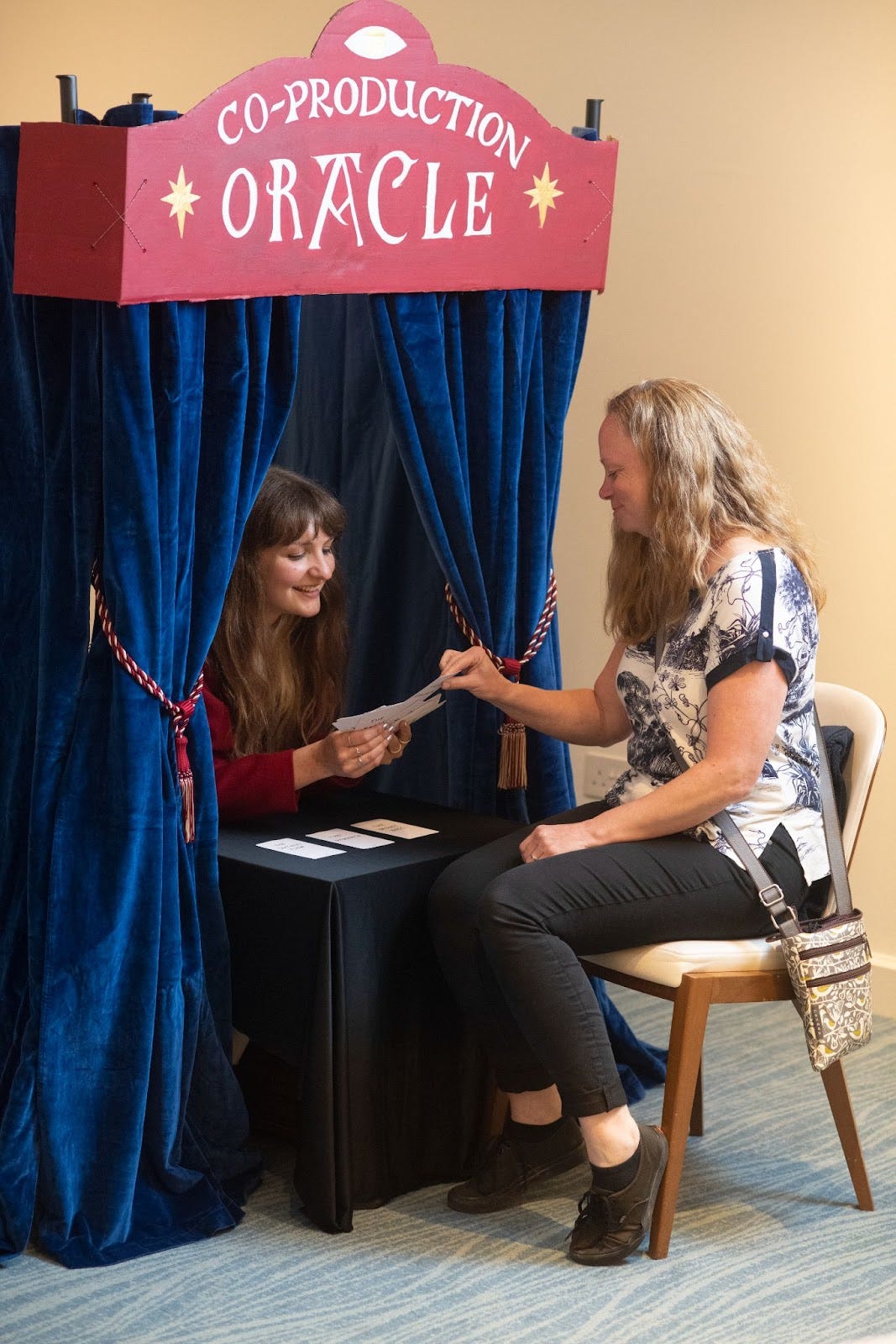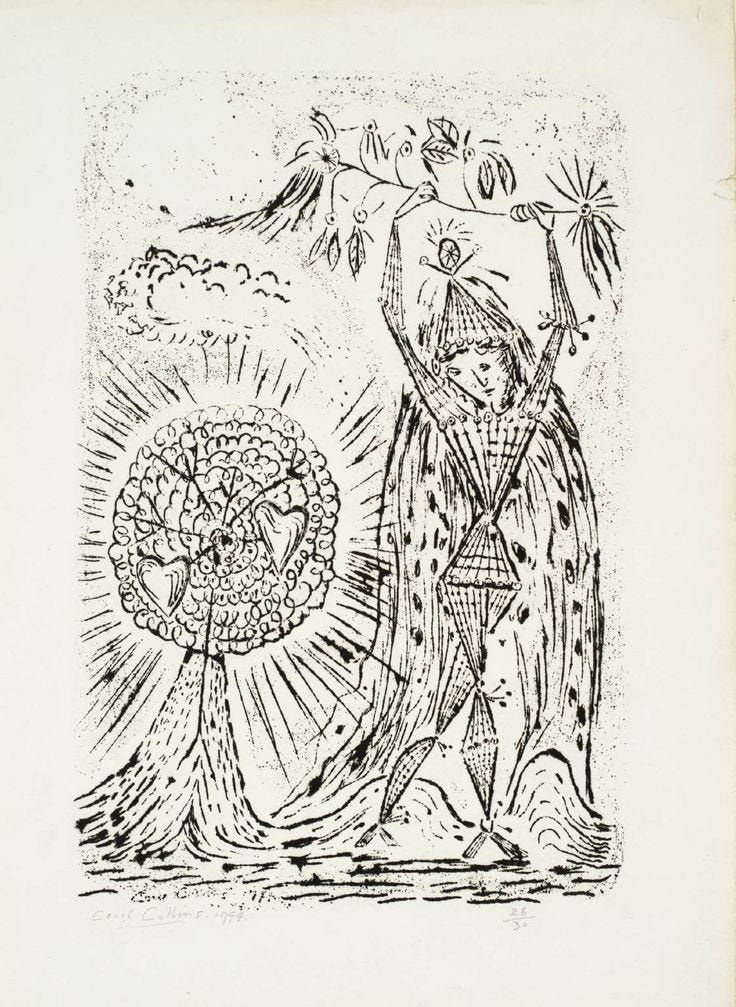Over the past year I’ve observed that in many work situations I fall into the role of ‘the fool’ - sometimes it’s as subtle as putting forward a sunny disposition with my co-workers in my day job; at other times I employ my foolishness to more overtly provoke and disrupt, especially in situations where I feel there are power dynamics that aren’t being addressed, or where people have gotten stuck in ways of doing things that feel trapping or overly formal.
In this edition of The Slow Burner, I want to look back on some instances of ‘playing the fool’ this year, and also explore the function of the character of the fool in Shakespeare and in society, as a figure who can provide light relief, but also be subversive, and reveal truths to an audience.
This July I facilitated an event in Sidmouth called Creativity & Joy that I had been planning for 6 months with an advisory group of artists with lived experience of ill-health. The day began with a wonderful, funny presentation by world-renowned artist and local purveyor of sarcasm, David Shrigley. I’m used to organising quite serious conferences for my day-job (when I’m not being an illustrator), and I can’t express what a cathartic experience it was listening to a presentation where, instead of formal silence, the audience was honking and snorting with laughter the whole way through! We had a fantastic, friendly and playful day of workshops including embodied drawing, dance, ceremonial staff making and surreal nonsensical musical performances. We ended the afternoon with a parade down to the beach with our ceremonial staffs, and some of us even went in the sea!
A group photo at the end of ‘Creativity & Joy’ with colourful staffs people had made, before parading them down to the beach
Me and David Shrigley (I made a special hat for the occasion)
For the afternoon of this event I ran a workshop called ‘The Orchestra of the Absurd,’ where I got participants to make line drawings of their experience of going through of the pandemic, where the beginning of the line was March 2020, and the end of the line was the present day - almost like a version of the infection-rate graphs we all looked at nearly every day on the news. When everyone had finished their line drawings, we delved into a pile of weird musical instruments and noisy found-objects in the middle of the room, until everyone had found something to make noises with. Then I put up each line drawing on the mantelpiece and ‘conducted’ the room of participants with their strange instruments, to perform each drawing as though it was a musical score.
Conducting the Orchestra of the Absurd
The result was a hilarious, spontaneous musical cacophony, that at the same time as being fun and cathartic, involved a process of witnessing what each one of us had been through over the past few years, and creating a shared expression of that experience (without needing to know the details). We made recordings of each piece.
Here’s a link to listen to our Orchestra of the Absurd live album “Covid Greatest Hits” https://on.soundcloud.com/G6HZq
Here’s what people had to say about the time we spent together:
Friendly, fun and a safe place to express. Play is often neglected in adulthood so it was nice to be able to do that with kindred spirits …
It was brilliant - exuberant, fulfilling, special, fun... without swearing I can't say any more on how good it was! The sense of shared experience it created turned 'networking' into a meeting of like-minded potential friends rather than people in specific roles that could be useful. Loved it - it was good medicine!
My experience was one of multiple surprises, all pleasant, including having my thoughts and perspectives shifted … I found myself moved to tears a few times, by synchronicity and beautiful stories and all of us climbing out of something different from everyone else, but the same … I haven’t enjoyed a day like that in a very long time, not just the pandemic years. It was joyous!
What I realised from this experience was that I have some kind of natural tendency towards silliness and the surreal, which is probably traceable to a childhood infused with Monty Python, Bill Bailey, Harry Hill and Peter Cook. I think that as a teenager me and my close friends centred everything around very strange, silly approaches to humour; I remember this as something that was a constant, and it’s still deeply embedded in my personality.
Doin’ a residency
Simultaneously to Creativity & Joy I also completed a residency this year with The University of Exeter, where, in my first meeting with the academic I’d be working closest with, I was encouraged to ‘be a troublemaker’. What a perfect brief for an illustrator! My residency required me to have lots of conversations with a community of researchers and understand what they thought about co-production, and then somehow help the community engage with this knowledge. I decided to convey my findings through an interactive deck of cards (more on this in a later edition of The Slow Burner). In the middle stage of the residency, at the annual retreat for the research community, I built an interactive installation, something like the equivalent of a fortune-teller’s booth (made with clothes racks from Wilko, vintage velvet curtains and a hand-painted cardboard sign) and invited attendees to come and have a card reading from the ‘Co-Production Oracle’. This was a bit of a creative experiment (I’d never done a performative, interactive intervention like this before), and I was curious to hear what people thought of it:
It was such a mind-opening experience. It made me realise that sometimes my mental models limit my perspective on how I see the world, and having such a chat allowed me to see from a different perspective and through the experience of others. It even felt relieving and medicinal! I just loved it!
Doing card readings from the Co-Production Oracle interactive booth
I’m really interested at this point to search for connections between the role of the artist and the role of the fool. I was curious to see what I could find out about the role of the fool in Shakespeare, and it’s interesting to read that fools tend to provide not only comic relief, but their role can also be to speak truth to the audience; using humour to point towards things like characters’ faults and flaws, or be the voice of conscience.
I recently came across the artist Cecil Collins (who was born near where I’m living now, in Plymouth, Devon and also taught at Dartington Hall) who is known for a series of works about the figure of the fool.
Cecil Collins, ‘The Joy of the Fool’, (1944)
This taken from The Tate (emphasis mine):
In 1942 Collins began writing The Vision of the Fool. First published in 1947 this essay highlighted his vision of what he described as the ‘mechanical jungle of the contemporary world’ (quoted in Keeble, p.74). Throughout the essay Collins links the Fool with the ‘Saint, the artist, the poet’ (Keeble, p.81) as the saviours of life. He explains: ‘modern society has succeeded very well in rendering poetic imagination, Art, and Religion, the three magical representatives of life, an heresy; and the living symbol of that heresy is the Fool. The Fool is the poetic imagination of life, as inexplicable as the essence of life itself’ (Keeble, p.73). The fool became a recurring image for Collins, appearing in many of his paintings and prints as an innocent figure who, although having no place in modern society, has the vision which is necessary to find fulfilment and eventual reward.
I feel like I’m starting to acknowledge how important it is to be playful, provocative and a trouble maker in my creative practice, and how these things might not be in contradiction with illuminating meaning and bringing stories to life. If you have any experiences of fooling around in your own creative practice or have come across any instances of artists using this as a mode, I’d be really interested to hear in the Substack chat!
Thanks for reading, and here’s to more fooling around in 2023!











